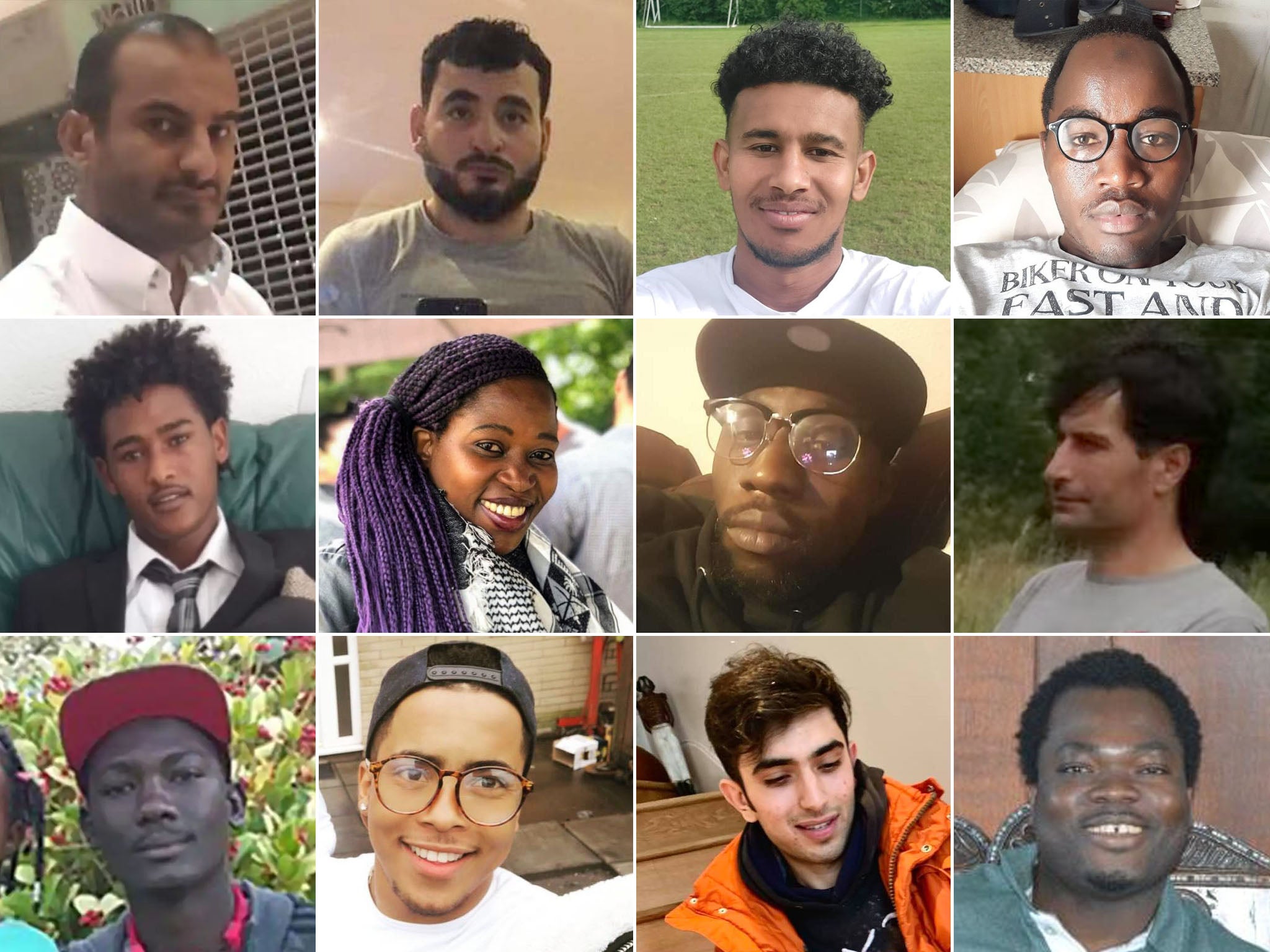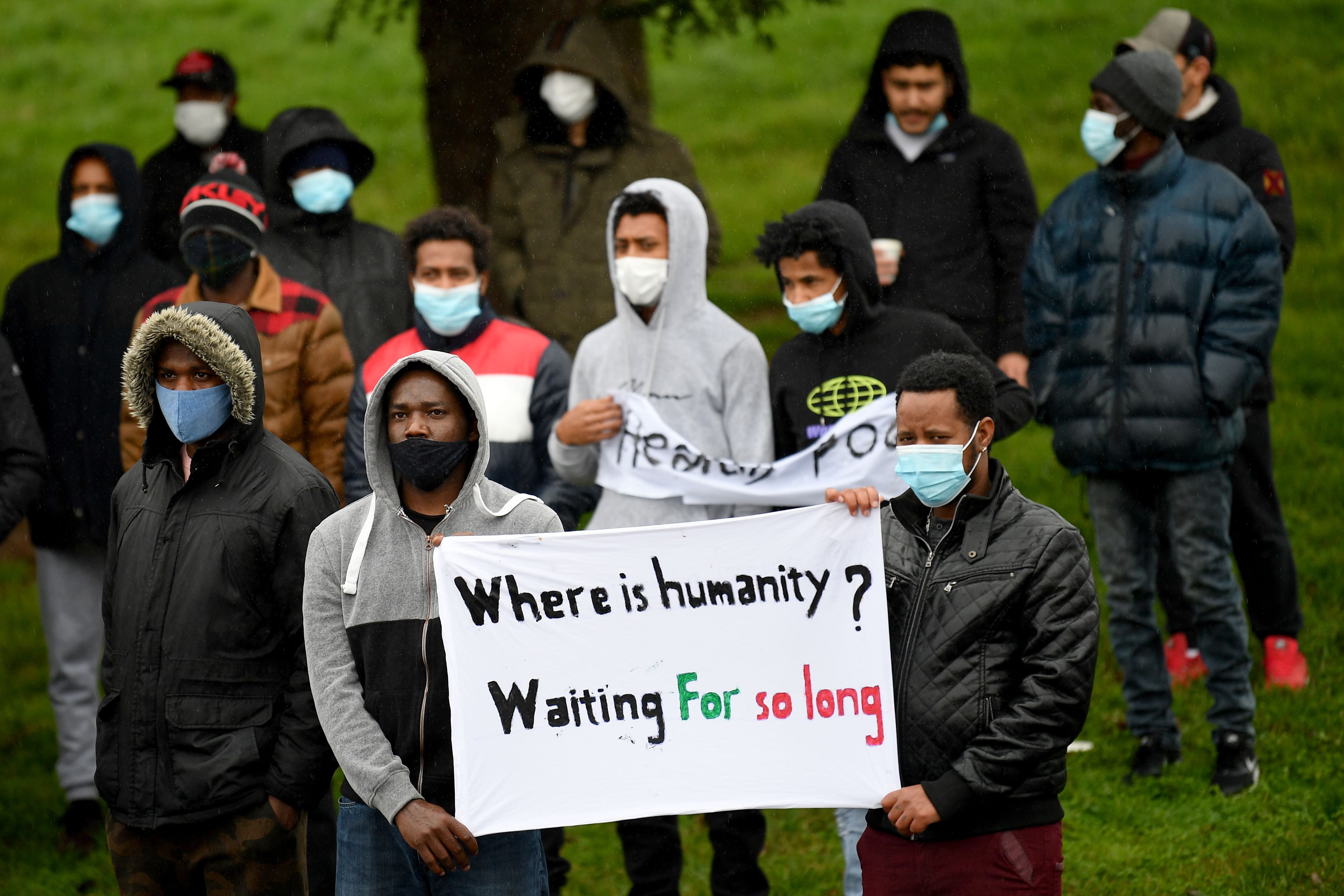The ‘forgotten’ lives lost waiting for asylum in Britain
Exclusive: At least 140 people have died in housing or hotels provided by the Home Office since 2016. Now a new memorial is telling their stories, writes Lizzie Dearden

Your support helps us to tell the story
From reproductive rights to climate change to Big Tech, The Independent is on the ground when the story is developing. Whether it's investigating the financials of Elon Musk's pro-Trump PAC or producing our latest documentary, 'The A Word', which shines a light on the American women fighting for reproductive rights, we know how important it is to parse out the facts from the messaging.
At such a critical moment in US history, we need reporters on the ground. Your donation allows us to keep sending journalists to speak to both sides of the story.
The Independent is trusted by Americans across the entire political spectrum. And unlike many other quality news outlets, we choose not to lock Americans out of our reporting and analysis with paywalls. We believe quality journalism should be available to everyone, paid for by those who can afford it.
Your support makes all the difference.When he arrived in the UK, Iranian national Shayan Zal Dehnavi was placed in a Home Office-provided hotel in Leicester while he waited to be told if he could stay in Britain. The conditions, according to another man on his floor, were “miserable”.
Soon after arriving, Shayan was stabbed in an apparently random attack, and the 24-year-old suffered a mental health crisis. Officials said he was directed to a GP and offered “additional support” but, despite guidance suggesting that people in Shayan’s situation should be moved into better accommodation as quickly as possible, he was kept in the hotel. Two months later, in May 2020, Shayan killed himself.
His relative Faranak Amini said the authorities must understand “how hard it is to handle and go through all the steps from the beginning to the end, to be accepted and allowed to live like a normal person”.
Shayan’s death is tragic but not isolated – figures obtained by Liberty Investigates and the Scottish Refugee Council show that, since 2016, at least 140 asylum seekers have died while in government accommodation. Twenty-one of those deaths are confirmed or suspected cases of suicide.
The overall number of deaths has risen sharply in the past two years, from four in 2019 to 38 in 2020, 48 in 2021, and 27 by the end of August this year.

Even more asylum seekers have died in immigration detention, including an unnamed man who died on 19 November after “becoming unwell” at the Manston processing facility. The Home Office on Saturday said that his death may have been caused by a diphtheria infection.
The period since the start of the Covid pandemic has seen dramatic increases in both the number of asylum seekers in supported accommodation and the time taken to decide claims, with a record 143,377 people now waiting for an initial decision. More than 40,000 of these asylum seekers are being kept in hotels.
Campaigners say many deaths have gone “unannounced or forgotten”, as the Home Office does not publish statistics on people dying in its care. A new website, the Asylum Seeker Memorial Project, has been created to record the names and stories of those who have died.
Eleanor Rose, the investigations editor at Liberty Investigates, said that year after year, more and more asylum seekers have been dying while staying in accommodation provided by the Home Office.
“We all have the right to be treated with dignity, respect and compassion, no matter who we are,” she added. “Those fleeing persecution or conflict in their homelands are often left struggling in poor accommodation, far from the people who care about them. Their deaths often go unannounced or forgotten.
“We hope this memorial – pieced together by our tenacious investigative journalists – goes some way to telling the stories of those the home secretary may otherwise forget. By giving a name to the victims, we want to remind the government of the families out there who deserve answers.”
The cause of death has not been disclosed in more than half of the cases, either because it is currently unknown or because it has been listed only as “explained” without any further information.
Several deaths were related to drugs or alcohol, while others were recorded as accidents or falls, and dozens were medical in nature. Causes included cancer, Covid, “suspected cardiac”, strokes, and one case of “birth complications”.
James Wilson, the deputy director of Detention Action, told The Independent that the figures “raise serious questions about the incidence of fatal health problems, suicides and unexplained deaths of people placed in Home Office accommodation”.

He added: “Recent reports have shone a light on the appalling conditions in which the Home Office forces many people seeking asylum to live. Worse, the home secretary’s spiralling backlog of 120,000 undecided asylum claims leaves more people at risk of exposure to those inhumane conditions. This government must clear that backlog urgently so that people seeking protection can get on with rebuilding their lives.”
Among the suicides recorded in Home Office accommodation was that of Romeo Nguase, a 22-year-old Namibian man who arrived in the UK in July 2020. He was originally sent to live in Glasgow, but was relocated twice against his will, eventually ending up in Hull.
Documents show that the Home Office was warned by Nguase’s solicitor that he suffered with mental health problems, and that failing to let him stay in Glasgow, where he had a support network, would have a “substantial and detrimental” impact.
In response to their first email, the Home Office said: “We do not have any evidence of his mental health issues on our databases nor other evidence has been presented. There are no compelling circumstances to keep him in Glasgow.” Nguase killed himself in the garden shed at his accommodation on 16 April 2021.
Another of the individuals remembered by the Asylum Seeker Memorial Project is Andres, whose name was changed at the request of his family. The 77-year-old Salvadoran man died in hospital from Covid-19 after falling ill at his Home Office hotel. His daughter said: “We all have the right to life and deserve a chance, and to be seen as human beings, not as animals.”

She voiced hope that the story of his death, and those of others, would “serve as a message to the representatives of this country so that they do not see a person as a problem or a burden”.
The 140 deaths were recorded in Home Office records obtained by Liberty Investigates and the Scottish Refugee Council, and cover the period between April 2016 and the end of August this year.
They include people who were living in supported accommodation governed by the Immigration and Asylum Act 1999, which covers homeless asylum seekers awaiting an initial decision or an appeal, and failed asylum seekers who are destitute.
Graham O’Neill, policy manager for the Scottish Refugee Council, said: “This memorial models what the UK asylum system must do: recognise the humanity of all those who lost their lives and support loved ones in mourning, learn lessons to prevent further loss of life as much as possible, and be transparent and accountable to families, friends and the public.
“No one can prevent all loss of life, but the UK asylum system must address the grim acceleration of loss of life in recent years – to prevent the need for this memorial to exist.”
The Home Office said any unexpected or suspicious death in asylum accommodation is investigated by the coroner and police in the same way as are deaths among the general population.
A spokesperson added: “The welfare of asylum seekers is, and always will be, of the utmost importance to us. It is misleading to suggest that any death that occurs while someone is in the asylum system is a direct consequence of that system.
“We work closely with the NHS, local authorities, non-governmental organisations and contractors to ensure that asylum seekers can access the healthcare and support they need.”



Join our commenting forum
Join thought-provoking conversations, follow other Independent readers and see their replies
Comments